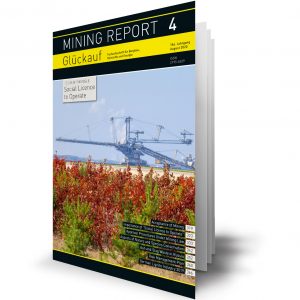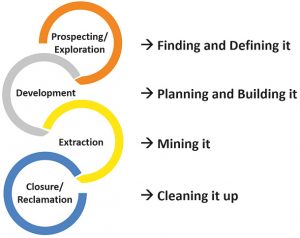By highlighting the theme of “Social Licence to Operate (SLO)” the present edition of Mining Report Glückauf is picking up on a subject that impacts on all kind of sectors worldwide, and not just the mining industry – though of course it too is affected by it. The Gabler Dictionary of Economics defines SLO as “the ongoing social acceptance of companies”. This is based on the intersubjective perception of members of society and is something that cannot be formally acquired or measured, it being closely linked to the principles of sustainability. The SLO refers to the acceptance by employees, shareholders and the public at large of the business practices …Read more
With my best regards // Mit freundlichem Glückauf
Dipl.-Ing. Andreas-Peter Sitte
Chief Editor Mining Report Glückauf, Essen
To the Acceptance of Mining
In our society there is a lack of acceptance for domestic mining. From the former glorification of technical skills, today an environmental hype has developed which condemns any intervention in nature, regardless of whether it is necessary or not. Measures for mining, for the environment and for the preservation or creation of good living conditions are therefore required. The solution is for mining and the environment to think together without any ifs and buts.Author/Autor: Dr.-Ing. Martin Wedig, Geschäftsführer der Vereinigung Rohstoffe und Bergbau (VRB) e. V. sowie der Fachvereinigung Auslandsbergbau (FAB), Berlin
Read moreThe Importance of “Social Licence to Operate” for the Mining Life Cycle
T At the Annual Conference of the Society for Mining, Metallurgy and Exploration (SME) in February 2020 in Phoenix, Arizona/USA, the debate on the term “Social Licence to Operate” was a focus. The title of the keynote session of the annual conference was: “The Executive’s Role in Tailings Management: Preserving our Social Licence to Operate”. In view of the recent accidents at mine tailings dams, the mining industry itself must revisit its “Social Licence to Operate” or, in other words, its responsibility as an operator and public acceptance of its business.Authors/Autoren: Prof. Dr.-Ing. Peter Goerke-Mallet, Prof. Dr. rer. nat. Tobias Rudolph, Prof. Dr. rer. pol. Jürgen Kretschmann, Technische Hochschule Georg Agricola (THGA), Bochum, Prof. Dr.-Ing. Jürgen F. Brune, Colorado School of Mines (CSM), Golden, Colorado/USA
Read moreApproval Procedures Under Mining Law – Legal Framework and Practical Challenges
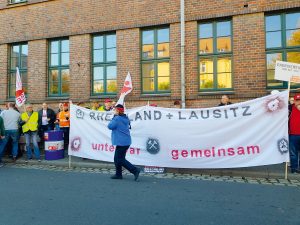
Fig. 1. Demonstration in Weisswasser for the retention of lignite-fired power generation in Germany. // Bild 1. Demonstration in Weißwasser für den Erhalt der Stromerzeugung aus Braunkohle in Deutschland. Photo/Foto: LEAG
Author/Autor: RA Dr. jur. Steffen Kautz, STKautz Rechtsanwälte, München
Read moreAspects of Nature and Species Conservation to Enhance Public Acceptability of Approval Procedures for Opencast Mines

Fig. 2. A temporary water body of approximately 100 m2 before establishment of vegetation – habitat for pioneer species.// Bild 2. Ein ca. 100 m2 großes temporäres Gewässer vor Beginn der Vegetationsentwicklung – Lebensraum für Pionierarten wie Kreuzkröte und Flussregenpfeifer. Photo/Foto: Beak
Authors/Autoren: Dr. rer.nat. Reinhard Reißmann, Dr.-Ing. Frank Schmidt, Beak Consultants GmbH, Freiberg
Read moreProblems and Prospects of Using Ash and Slag Waste in Russia, Taking into Account European Experience
Taking into account the energy balance trends, there is an urgent need for ecologization of coal-fired generation. The paper discusses the development of legal frame base in the field of ash and slag waste management. The main provisions of the program “Energy Efficiency and Development of Energy”, contemporary challenges and threats to the environmental safety of the Russian Federation according to the “Strategy for the Environmental Safety of the Russian Federation for the Period until 2025” and the current situation in the field of generation and processing of ash and slag waste have been analyzed and compared with the world praxis …Authors/Autoren: Valeriy Grishin, Ministry of Energy of the Russian Federation, Moscow/Russia, Prof. Dr.-Ing. Konstantin Kolikov and Natalia Udalova, National University of Science and Technology (MISiS), Moscow/Russia, Natalia Lubenska, Schauenburg Maschinen- und Anlagenbau GmbH, Mülheim-Ruhr/Germany
Read moreRisk Management Plan for Abandoned Mining Infrastructure
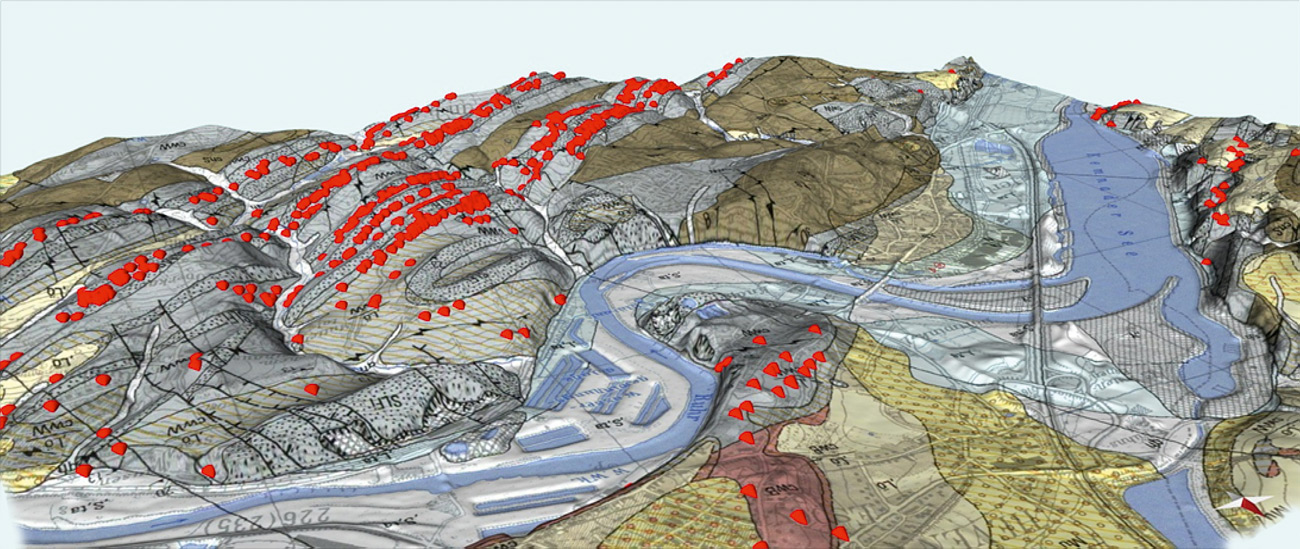
Fig. 1. Risk management plan for abandoned mining infrastructure. // Bild 1. Risikomanagement Altbergbau. Source/Quelle: GD NRW
Authors/Autoren: BVAR a.D. Dipl.-Ing. Rainer Fimpler, AdM OBVR Martin Isaac M. Sc. und BVAR Dipl.-Ing. Stefan Mengede, Abteilung 6, Bezirksregierung Arnsberg, Dortmund, OGR Dipl.-Geol. Bernd Linder, Geologischer Dienst NRW, Krefeld/Germany
Read moreThe German Lignite Industry in 2019
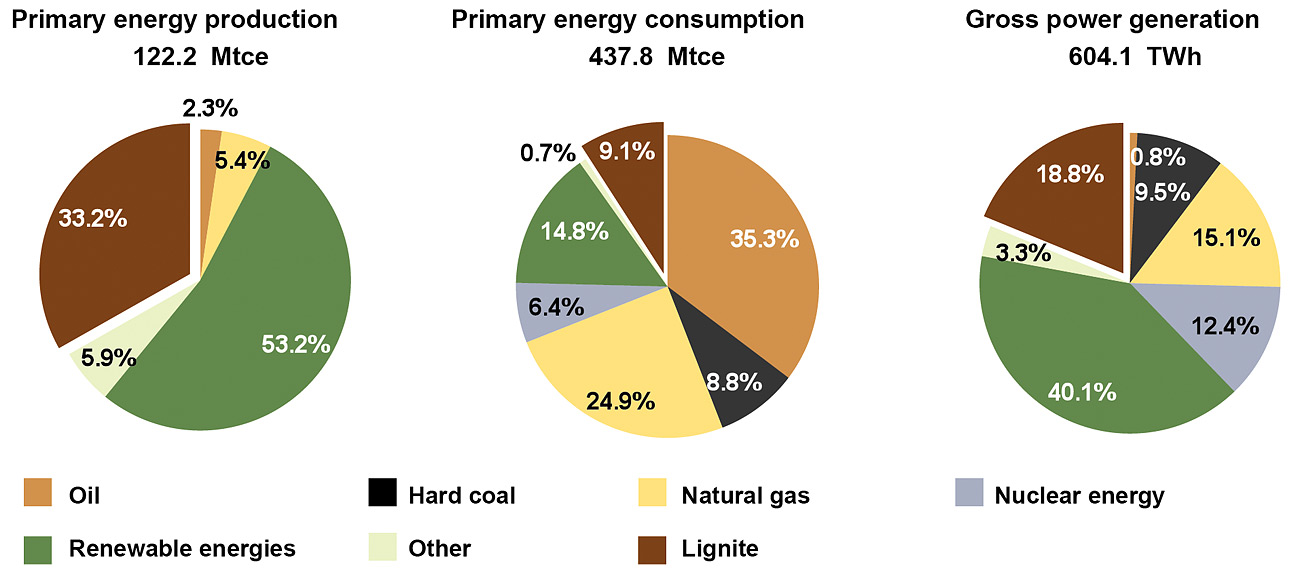
Fig. 1. The role of lignite in Germany‘s energy economy 2019; position: March 2020. // Bild 1. Die Rolle der Braunkohle in der Energiewirtschaft Deutschlands im Jahr 2019. Source/Quelle: Arbeitsgemeinschaft Energiebilanzen und BDEW; Stand: März 2020
Authors/Autoren: Dipl.-Volkswirt Uwe Maaßen, Geschäftsführer Statistik der Kohlenwirtschaft e. V., Bergheim, Dr. rer. pol. Hans-Wilhelm Schiffer, Member of the Studies Committee, World Energy Council, London/UK und Lehrbeauftragter für Energiewirtschaft an der RWTH Aachen, Aachen/Germany
Read more